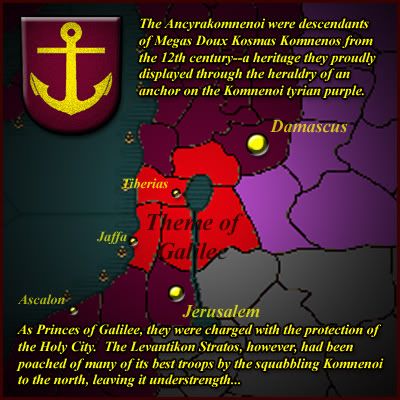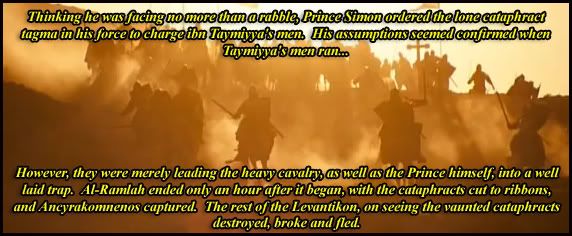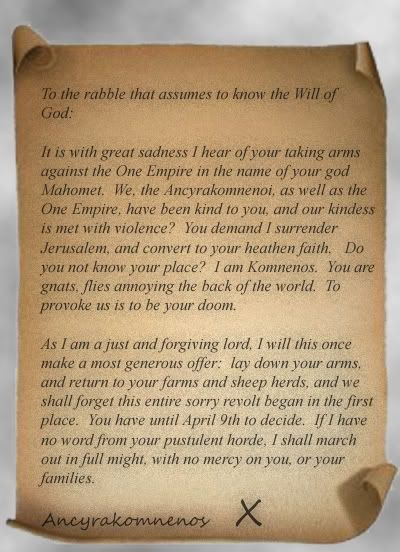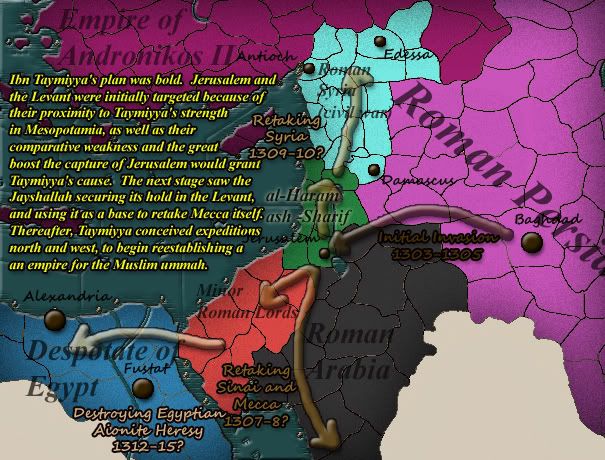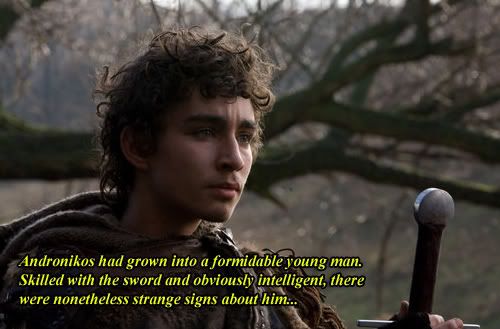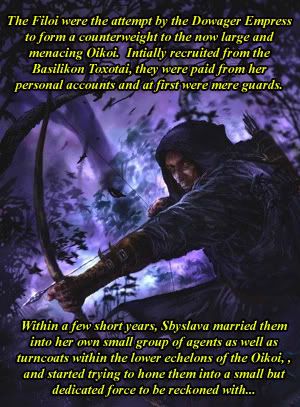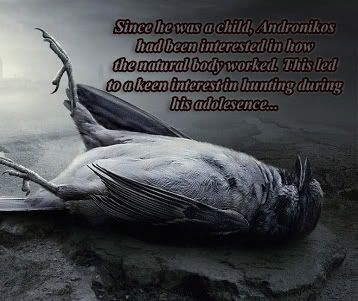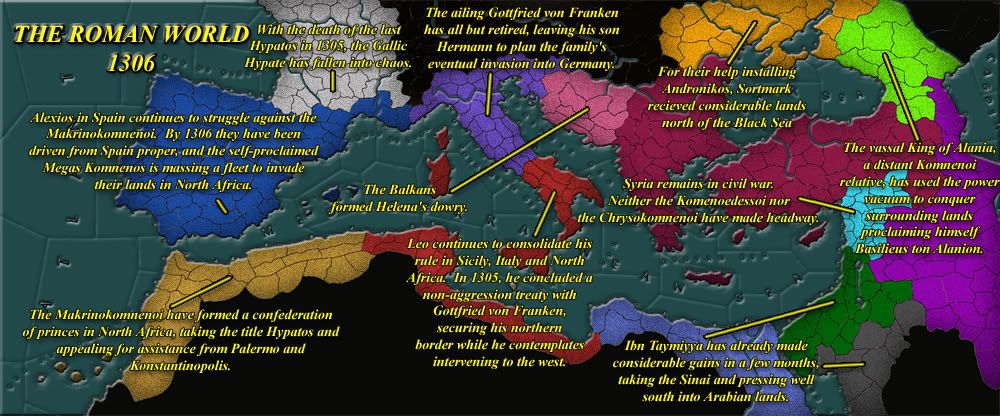I'd like to apologize for the long delay, but the update is finally here! I'll have proper replies up ASAP as well!
“Jerusalem the city is a mere place. What we fight for is the Jerusalem in every man's heart—his soul, and its relation to God.” - Taqi ad-Din ibn Taymiyya
September 16th, 1305
The air over Jerusalem stank.
Part of the stench, Taqi a-din ibn Taymiyya told himself, was the normal smell of a city—dirty, crowded, with public walkways used as latrines. Part, he smiled slightly, was present company—neither he nor any of his
qabbatin had bathed properly in several days. There had been so much to do, so much to plan, and then the walls themselves...
The majority of the smell, however, was the smell of victory.
Jerusalem was an ancient city, a formidable, well-fortified position. When Taymiyya's army began the siege two months before, they didn't have a quarter of the siege equipment
Qubtan Abbas, a former engineer in the Roman Persian army, claimed they would need. Nonetheless, through their steadfastness and faith, here they stood, atop the tallest tower along the walls of Jerusalem, surveying the Holy City as the banners of the
Jayshallah slowly rose to the top of towers, spires and buildings as far as they could see.
Victory and defeat smelled almost the same, Taymiyya reminded himself. It was sobering, something he kept close in mind when pride started to inch into his thoughts. Victory and defeat shared the same sickly stench of dead bodies and sweat. They were closely intertwined, linked, one shadowing the other. Taymiyya's
jihad had seen it's fair share of both in its first two years—the walls of Kerak wouldn't yield, but the
Komes had charged out after Taymiyya's army withdrew. He found to his regret that the
Jayshallah was no roving mob of bandits, fleeing a castle.
Al-Ramlah was nothing like that, however.
Taymiyya remembered that day well.
The
Levantikon Stratos was a mere shell of an army that sharp May morning, it was true. The ongoing war between the Edessan and Antiochiean Komnenoi further north had stripped it of two of its three imperial
tagmata, as well as five of its seven princely
tagmata. The vast majority of its 16,000 men that day, Qayyim later gleefully reported, were levies and conscripts, drawn predominantly from Tyrus, Baalbek and Damascus—the Prince rightly did not trust the Muslim men of his own domain to fight. Taymiyya hadn't worried about the two princely regiments at the core of Ancyrakomnenos' army—they were well equipped, yes, but the Aionites years before had been as well.
The
kataphraktoi of the
Athanatakoi were a completely different beast.
His whole army had shivered as those men in shining mail, riding huge horses sparkling with steel barding, had lined up in the center of Galilee's ranks. That line of steel, that mailed fist—it was awe-inspiring, frightening. The Aionites had nothing like true Roman heavy cavalry, yet here were 1,200 of the Empire's finest, in full panoply, lancetips bright in the morning light.
An oaf could've read Galilee's plans—most of his army were levies, substandard. That armored tip, the best, the strongest, the most feared, would charge and crack what the Prince assumed to be nothing more than a rabble. Once Taymiyya's men broke, the rest of the Roman army would move forward, and mop up the survivors. The plan was simple, direct, and flawless, save one problem.
Taymiyya's men didn't break, until just before the moment of impact.
Then they turned, and ran, his footmen at full run. Taymiyya remembered how the Roman horns blew in triumph, and those heavy horsemen broke into a gallop, speeding away from the rest of the Romans , eager to run down their fleeing prey. Taqi's heart still rose into his throat thinking of that moment, of how close things had come...
“Thinking of al-Ramlah?”
Taymiyya blinked as Qayyim's voice brought him to the present once more. A thick, black column of smoke rose from in front of the main gates of Jerusalem, where the the
Jayshallah launched their first attacks against the depleted defenders of the Holy City. It was a good distance where Taymiyya stood—the squat, square tower along the city's outer wall, abutted next to the former Muslim Quarter.
Just like Ascalon. Just like Gaza.
It was no coincidence that in each city, the wall closest to the Muslim Quarter fell first.
“Yes,” Taymiyya confessed with a slight smile. He knew what was about to come. Giddiness was infectious, and his officers and men had much to be giddy about this day.
“Why?” Qayyim asked. While there were no more words to his question, his eyes spoke volumes.
Why are you thinking about that triumph when THIS one is far greater? Retaking Jerusalem after over two hundred years of occupation by the infidel? Al-Ramlah was only the introductory chapter!
Yes, it was, Taymiyya told himself. As his eyes passed over the city, past the Christian Church of the Holy Sepulchre, then the Dome of the Rock, shining brilliantly in the glorious sun. Despite the cheers of celebration, the prayers of thanks, he knew Jerusalem wasn't the end—no, it was a chapter, an exclamation point, the first step in a long journey. Taqi tapped a finger on those ancient walls—walls that had seen Assyrian, Persian, Roman, Rashidun and Roman hosts once again outside their boundaries. Here was the central position, the pivot where the
Jayshallah could turn north, to retake Syria from the Roman families of Antioch and Edessa. It could turn south, to destroy the insignificant Roman Kingdom in Arabia. Or it could turn west, and make for the Aionite stronghold of Egypt, it's land rich and powerful.
Taymiyya's eyes went back to the tents outside the walls of Jerusalem, and he sighed with approval. His men. Those brave men that had believed in his vision, that followed him with no question—at al-Ramlah, they performed Taymiyya's feigned retreat to perfection. The Roman heavy cavalry, in its eagerness for victory, charged headlong into a trap, as Taymiyya's lighter horse rode around their flanks. In India, Taymiyya had seen the worst that could be done by a Mongol horsemen, and his men rode Mongol style, armed with Mongol style bows. The Roman horse was whittled down, bit by bit as it lumbered on, the 'fleeing' infantry staying just out of its reach as horses were peppered with arrows.
“Perhaps we should bring Lord Galilee up here to see this?” Taymiyya smiled thinly. They'd found that pompous, proud little man in a heap when the day was done. There were no harsh words or proud final pronouncements from that small man—only the harsh rasp of a parched throat, whimpering for mercy.
“Ha!” Qayyim laughed, and Taqi smiled—when his friend chuckled, it was with no reservation. Big bellyfulls of laughter rolled over the parapets of the newly Muslim Jerusalem, much to the amusement of Taymiyya's
qabbatin gathered around. “We should!” Qayyim echoed a moment later, “And we should make him watch while we drive the infidel out out of the city!”
Expectant eyes looked at Taymiyya—eyes that had insult after insult heaped on their faith by the Romans, eyes that spoke of returning and eye for an eye, a hunger to make the Romans feel what they had felt for two centuries. Taqi's eyes caught more than a few hands already hovering near a sword.
Retaking the lands of the
Ummah so they could be free of Roman oppression was one thing. Unchecked violence? Massacres? No. The
Jayshallah was more than a mere army. A mere army would rape, murder, and pillage its conquered. The
Jayshallah was a messenger, to enforce and spread the Word of God.
“Did Umar drive the Christians out of the Holy City?” Taymiyya raised his eyebrow in return. More than a few eyes blinked at his words, but Taymiyya didn't care. He could read the protests—leaving Christians unmolested in their rear would provoke attack! Taymiyya visibly shook his head. “There will be no forced conversions, no sack, no taking of property past the issuance of the
kizya,” he said.
Taqi heard the slight inrush of breath from some of his commanders—no doubt they had not expected those words to come from the words of their
Sefyuallah and
Amir. Those who'd been with Taymiyya the longest though, knew better. Taqi glanced over at Qayyim—his friend merely shook his head and smiled.
“Why are you so kind to them, after what they have done?” a voice asked. Taymiyya looked up—it was old Muhammad Sabha, a
qubtan who'd seen half again as many winters as Taymiyya, as well as the dark underbelly of the Roman world. “They levy extra tax on us! In Samarra they made people convert by the point of the sword! In Syria they turn our mosques into heathen temples!
Siddiq. no one says to kill them all!” Sabha looked around imploringly, “just deport them from the city! Make this a city for The Faithful, just as they have made countless cities in Palestine only for the heathen!”
Taymiyya weighed his words carefully, glancing to the left. Scribes he'd summoned to record the event stood, anxiously waiting. The words he was about to say would undoubtedly be scrawled down, within a week speeding to various
ulema across Mesopotamia and the Near East. They would be quoted, they would be repeated, by a new generation of Muslims seeking to defend their faith.
"God establishes the Just state even if its non-believing, but does not establish the tyrannical state, even if it is Muslim," Taymiyya sighed. The words hung in the air and in his mind for a moment, before he nodded. Yes, that would be the subject of the next letter to The Faithful. “Justice is letting the infidel stay in Jerusalem, to see what we will build, to experience life amongst The Faithful.
That,” Taymiyya smiled thinly at his vision, “will bring them to the fold, far better than any sword, or any words. Deeds, my friends, are the most powerful sermon of all. As it says in the Quran
'And call on to your Lord's path with wisdom and kind remembrance, and debate them with excellence, for your Lord surely knows he who is of the deviated path, and He surely knows the well-guided.'”
For a moment, silence hung in the air. Taymiyya's heart hung for a moment—did they disagree with his words? Then, he heard the slight scratch of a quill on parchment, then another. Then muttering, murmuring. He looked up—all the
qabbatin were nodding their heads slowly, muttering the same phrase:
“It is God's Will.”
Taymiyya sighed—relieved that his vision of the world to come had survived its first true test.
“For now, my fellows,” he said, his voice steadier than his heart, “we need to prepare. The Romans will surely come,” Taymiyya nodded. “Qayyim, put the new recruits in five
qabbatin,” Taymiyya nodded. Yes, keep the from the front, let them train a bit first. “Sabha, I want you and your three
qabbatin to move into the Golan. Oh, and Qayyim, take one of the scribes and make a copy of Galilee's letter,” Taymiyya added. “Read it to the recruits.”
Qayyim nodded, and headed away from the scene of Taymiyya's greatest triumph so far. Taqi still had that aged parchment in a trunk back in his tent. Qayyim had peppered it with some concoction to keep it well preserved, and every now and then, Taqi would show it to his men, and remind them of its haughty, dismissive words. The fact the words of a dead man roused them to fury and great deeds far more than Taqi's own gave him no shortage of amusement.
“Three
qabbatin?” another
qubtan asked. “Is it wise to divide our forces? Surely we should march all our men north, and...”
“The Romans will come,” Taymiyya cut him off, nodding. “But not from the north, and not in great numbers. Sirs,” Taqi asked, “who do the Romans hate more than Muslims?”
“Who?” the
qubtan walked into the question.
“Each other,” Taymiyya smiled thinly. “They'll come, in dribs and drabs,” Taymiyya said. “A few here, a few there—the Romans can't bear to look away from each other to turn their true swords to us. No, remember they think us gnats, flies that can be easily swatted away.”
Taqi felt his teeth grit together at the thought. Yes, they dismiss him, and dismiss his men. One more Muslim rebel, a overgrown bandit, a hooligan, the Romans would tell themselves. Someone that just deserved a swift thump from a 'proper' army and he would disappear, just like Alaeddin Naijar, just like countless other would-be zealots, reformers, rebels, and kings! Even as he looked across his army, victoriously holding the Holy City, he could see the Romans of distant Konstantinyye, Al-Iskandriyya, and countless other places looking down their nose at him, muttering about cutting the tallest stalk of wheat.
The image—their haughtiness, their disdain, and above all, their complete disregard for Allah and his people, made his blood boil. He looked at the fierce captains around him, covered in grit, mud and blood. His smile changed into something fierce, like a tiger looking at her cubs.
“
We are more than gnats, my lords!” he pointed to the tents of the army, where cries praising the greatness of God still rang in the air. “We are no fleas to be brushed off the back of this great beast!” he thundered. “We are warriors of God, my friends! Warriors who will will hold on to the Roman monster and never let go, never surrender until their realm collapses broken...” his voice softened, eyes aglow, as he watched his enraptured men, “...a mighty beast, brought down by a swarm of
gnats!” his arms swept wide, encompassing not just his army, but his ideas, his faith, his fellow Muslims...
June 1st, 1306
Dowager Empress Sbsylava, Regent of the Roman Empire, looked over at her
Megoskyriomachos and fought the urge to growl in frustration. Roland du Roche, however, paid little attention. He was too busy receiving plaudits from Sbyslava's son, the soon to be of age Andronikos Komnenos,
Megos Komnenos and Emperor of the Known World.
“Your Majesty can feel free to test her,” she heard
Megoskyriomachos say, scarcely paying attention to the glare of his nemesis. “She was caught on my estate outside of Kalliopolis. Well trained as well.”
“Is she?” Andronikos asked, stroking the head of the large falcon now resting calmly on his arm. “She is very pretty, don't you think, Mother?”
“Very,” Sbyslava said simply. She told herself she wouldn't give du Roche the satisfaction of seeing her unease, but she felt a small frown still slip through as her beamed at her son's pleasure.
“You did well. Thank you,” Andronikos smiled. “If she does well, she'll become my new regular falcon. Oh, speaking of doing well... mother? Is she pretty, mother?” Andronikos asked.
The Dowager Empress' frown grew, even as she saw the
Megoskyriomachos look up at her expectantly as well. In a short time, Andronikos would cease to be a boy, and become the most powerful man, on paper at least, in the entire Christian world. As such, he was naturally called on by numerous powers and potentates seeking a marriage alliance. Sbyslava had arranged her son's betrothal in secret, weighging offers from as many suits as possible without letting any know who was in the lead. Only earlier in the day had she told her son her choice.
Helena von Franken, politically the most useful potential bride out there. A granddaughter of Gottfried, she would secure, by blood, Andronikos' eastern flank, ensuring that this powerful family was now an imperial ally in regards. But was she pretty? She wasn't ugly—she was a tad plain faced, a little too thin, with a longish nose for her face and freckles despite being almost 17. By all reports she was pleasant, intelligent, and obeident. Andronikos, however, had already made eyes at the Angelos twins, as well as the niece of Roland du Roche, the beautiful (and available) Ermisinde. In comparison to that stellar array of beauties, poor Helena was decidedly earthbound.
“She has her charms, you will find,” Sbyslava answered carefully. She watched her son's eyes—they narrowed for a moment, and she could seem him weighing her careful wording. Andronikos wasn't one to take such a statement at face value. By his momentary frown, she saw he'd read between the lines. He would do his duty—the boy was good about knowing his role as
Megas Komnenos and performing it as best he could—but he wouldn't be
pleased about it.
“Good,” Andronikos said, his bright young voice surprisingly even keeled. He hid his disappointment well. He whistled sharply in the air, before raising his gloved hand. A few moments later, du Roche's gift came back and lithely landed on its master's perch. The fifteen year old's hand dropped slightly under the weight of the bird.
“Don't slouch. Your father wouldn't slouch,” she chided, wincing at the sound of her own voice. “Remember,” she softened her tone, “your must
look the part of an Emperor at all times, Andronikos, whether you are at play or in court.”
Andronikos glared at her for a moment, before sighing and straightening his back. He looked back at her, eyes bright, imperious even. She smiled—he had the eyes, cold, hard even. Eyes that could make a man shiver—imperial eyes. Satisified he'd won her approval, he reached to his belt with his free hand and took out yet another small vial. The latest concoctions were a mixture of lime juice, mead and ground up willow bark. Sbyslava frowned—yes the churigeons said it would calm the boy's nerves, but her son was only 15.
He shouldn't be ingesting medicine at this rate.
It'd started with nightmares—that she understood. Surviving an assassination attempt at age 13 would unnerve anyone. It'd been sudden—a normal procession to the
Hagia Sophia interrupted by a knife wielding man proclaiming Andronikos was a false ruler. To his credit, her son's reflexes were on the level of a cat—the man literally leaped over a barricade, knife aloft, and her son spun out of his way in heavy robes in the blink of an eye. The next instant, he had ceremonial
Storm was out of its scabbard, and a moment later, the man's throat was slashed open, before the Emperor's guards even had a chance to move.
Skjalm had trained the boy well—yet he still had nightmares, cold sweats, dreams that a man with a knife was standing in his chambers, hiding behind this curtain or that. He couldn't sleep without three guardsmen in the chambers with him, as well as a
pentarchy outside his door and a full
chillarchoi deployed around the palace at any given time.
Andronikos looked up, and then hefted his falcon into the air. The bird of prey immediately spotted what it's master had seen—a sparrow flying nearby. Sbyslava smiled. The boy was testing his new pet. If it was agile enough to catch something as small and quick as a sparrow, it would make a fine falcon indeed. The larger, heavier falcon was already climbing rapidly. Sensing its doom approaching, the sparrow went into a sudden dive. The falcon banked, then followed.
Andronikos had survived the dagger wielding fool, but just as the hapless sparrow ducking and weaving away from her pursuer, the position of the boy-emperor was still tenuous. He was underage, and his mother was a foreigner, and outsider to the Roman court. He'd been installed by a foreign army—a situation that took nearly a year and delicate diplomatic manuevering and scheming to extricate her son out of. Her fears about Skjalm had proven correct—he had demanded “compensation” for his assistance, and the price of her not going through the political suicide of marrying a foreign king had been Pereschen and Moldau to the crown of Sortmark, as well as 6,000 Danes left behind to serve as the 'bodyguard' for Skjalm's godson.
“She's fast!” Andronikos looked up at the falcon in wonder, before looking over at the
Megoskyriomachos.
Sbyslava's eyes narrowed.
During that first tenuous year, Roland du Roche had proven his worth in gold, if only because his interests and Sbyslava's united—since he'd marched into the city alongside her and the Danes, he was seen by many as part of the cabal. Thus, it behooved him to...quiet...as many leading voices of the resistance as possible, whether through bribes or more secret, dark methods. Yet for every feat of subterfuge he undertook on her son's behalf, what little trust Sbyslava had in the man waned even further.
He was why she'd taken the drastic step of embracing the Danes left behind, draining her personal coffers and denting the Imperial treasury to ensure they were highly paid and motivated to protect her son. They might not have been the delicate scalpel like the
Oikoi of du Roche, but a Danish axe cut much harder and deeper when roused.
That, however, wasn't enough—not for the Dowager Empress' conscience.
After that first tenuous year, after she had a loyal bodyguard around her son and her own network of spies arranged throughout the capital, the need for Roland du Roche had waned. The
Oikoi and their head were now a liability, not a boon, a Sword of Damocles hovering above her head and her son's legitimacy.
She knew she needed to act—and act she did.
“She's from the best,” du Roche beamed at the young Emperor. “Nimble, fast... she'll catch any quarry she sees,” the
Megoskyriomachos said with some pride, just as the falcon's talons ripped into the back of the hapless sparrow. Both animals tumbled to earth, the falcon's wings spread as she landed with her already dead prey.
Sbyslava smiled harshly—she too had searched for the best, and sent them the way of the
Megoskyriomachos.
Six assassins in three years. Sbyslava could only shake her head.
The man was good.
She'd tried subtlety—one of her personal
Filoi concocted a complicated scheme, involving three different poisons, each administered to a different course of meal at Du Roche's home. Individually, they had no effect, but combined, they were lethal—or so he claimed. The dinner party left a death toll of sixteen due to 'sudden bloody flux,' but Roland du Roche was not among them. He'd suddenly decided he wanted no dessert, only minutes before his fellow guests suddenly grew ill. There was of course the following half-clumsy attempt to surprise the man and his retainers in an alley—even Sbyslava admitted it was rather unprofessional an effort, though she lost a low ranking
Filos and twenty streety thugs who the city didn't need anyway. A poisoned cloak, a gift of a clock filled with
pyrokaroi powder, none had worked.
Du Roche was
really good.
She had no doubt he knew who his nemesis was, but the man was also professional—he said nothing to her about the attempts on his life. There was no decrease in information coming to the Regency Council, nor any counterattempts on her own life. There was no charity in his actions—she knew he wasn't a fool. Whatever maneuvers he was conducting were completely shrouded in shadow. Her
Filoi had pierced several echelons of the
Oikoi, but not nearly enough. She could do little but stay on guard—and keep searching for her own 'falcon' to destroy the main threat to her son.
“If only there was a falcon like her to drive away the buzzards around the Holy City,” the
Megoskyriomachos sighed as his gift flew back to her master.
Sbyslava nodded, and didn't blink. The news had been on the lips of everyone, high and low, for over half a year. Jerusalem had fallen to some Muslim renegade named Taqi ibn Taymiyya and his ragtag force of bandits. Daily, news arrived of more cities falling to his men—Ascalon, Gaza, Joppa, Tiberias. Clerics high and low were calling for the lords of Christendom, high and low, to set aside their differences and free the Holy City from the grasp of the infidel. There was even talk that perhaps the Komnenoi brothers might lay down arms, at least temporarily, and all sorts of noises and rumors from Palermo to Cordoba breathed life into such a hope.
“If only,” the young Emperor handed the bird to a retainer, before walking over to the broken form of the tiny sparrow. He knelt, examining it. Sbyslava glanced over at the imperial retainers. More than a few looked nervous, as if they'd seen this before. She cleared her throat.
“Andronikos, what are you doing?” she asked.
A gloved imperial hand now held up the mangled bird, while the other calmly poked into its innards. “Funny,” the Dowager Empress could barely hear her son mutter, “sparrow intestines are shaped differently...”
“Andronikos...” There were days Sbyslava cursed Andronikos' tutors back in Havigraes. Learn by exploring nature, they said! The book took that to mean poking about every animal killed on the hunt to discover what its insides looked like. Two servants said on a hunt three months before, they'd found the emperor eating part of a deer lung, uncooked. Sbyslava's men had found out about their slandering and punished them for the crime. Her boy was strange in examining anatomy—he even kept notes on every animal caught, saying one day he would write a book on hunting—but eating bloody organs?
“They say everyone is sending troops to free the Holy City,” Andronikos said a few moments later, calm as a morning breeze as he set the destroyed animal back on the ground. He walked over to the retainer holding the falcon, and petted the bird with his bloody glove. “Alexios even swore he'd raise and send ten
tagmata! Leo said he's sending the Godwinsons. It'll be a vast host! When I'm of age,” the boy-emperor said firmly, “I'll take up the cross and lead the army south too!”
Sbyslava winced slightly, both at her son as his strange interests, as well as the conundrum that had bothered her since news first arrived about Jerusalem. On the surface, Andronikos leading an army south seemed an alluring, even compelling idea. He needed legitimacy in the eyes of the army, and the Komnenoi had always won the
tagmata loyalty by taking the victorious field. She'd wondered long and hard about the situation. It was an opportunity that screamed for her son to earn his spurs. With Bataczes and von Franken answering to Konstantinopolis, his flanks were secure, and he had a formidable army to lead south. Like many around the Empire, Sbyslava knew that this ibn Taymiyya and his followers were nothing more than a flicker in time. They'd beaten Prince Ancyrakomnenos, yes, but his 'army' was barely battle-worthy. If her Andronikos moved into the Levant, it'd be at the head of the
Basilkon and
Anatolikon Stratoi, easily nearing 100,000 men of imperial
tagmata skill and rank...
Yet... Sbyslava frowned.
Yes, if her son moved south with the might of even his depleted armies, victory was almost assured—this heathen upstart had fewer than 20,000 men at last report. However, it'd leave a precarious situation in Konstantinopolis—there would be less men to guard Andronikos' new realm, and an open opportunity for dangerous politicking in the capital while he was away. There was also the problem of who would accompany him on campaign? She couldn't—the Danes might respect women capable of fighting, but Romans? No, it was barbaric, indecent to them. Bataczes was too old, and now crippled with creaking joints and aged bones. Du Roche? No, he'd use the opportunity as a chance to turn Andronikos against his mother.
“My son, I would counsel...against... a campaign,” Sbyslava said slowly measuredly. It'd taken time, practice, to learn to change her words from saying
No, you can't to
I counsel you shouldn't. It was a change every parent had to make, but for the parent of an emperor...
She watched as her son looked up at her, glaring again. He wasn't pleased by her words, but he said nothing. She knew that look—he expected her to explain her reasoning.
“I fear it is a common ruse to weaken us,” Sbyslava said slowly, her words gaining momentum as her mind linked thoughts and facts. “I fear your brothers intend to send their levies or lackluster troops, while they keep their elite
tagmata close to take advantage of their neighbor's weakness. It would be wiser, I think, for us to wait until we know what men they have sent...”
Sbyslava's eyes drifted up to the other man, the second Regent in all but name. Roland du Roche's eyes met hers—blank, unreadable—but his mouth remained shut. She thanked the Good Lord above for small favors, even as she saw Andronikos huff.
“Mama, even
Theodoros has been granted passage by the Godwinsons with his 500 riders to sail to Jerusalem!” Andronikos finally complained, his tone as quiet as hers. “I do not see why...”
“That, my child,” Sbyslava's lip curled up sarcastically, “was so they could be rid of that whelp once and for all. He won't get far. Better to see who Leo, or Alexios
actually sends, and not who they
promise to send.”
Her son looked at her, then looked down, tapping his boot on the ground. Yes, he was thinking.
“Fine,” his voice said, even as his eyes said the opposite.
For the briefest moment, Sbyslava caught du Roche glancing at her son, and she knew.
“Good,” she nodded, her mind abuzz. Andronikos was stubbornly going to have his way, and in five short weeks, there would be little Sbyslava could do to counteract his whim. So she would make the best of it. Roland du Roche would be leaving the city soon. If his quiet encouragement made her son march to war, she would be
damned sure he marched out as well—after all, behind the ancient Bataczes, du Roche was perhaps the finest commander left in the armies loyal to Konstantinopolis. He would surely agree—months alone with her son would definitely be a lure that pulled hard. In the off chance he smelled a trap, refusing to march with his young Emperor could be construed as cowardice, even treason.
Sbyslava smiled, a plan filling out in her mind. Perhaps this wouldn't be such a bad thing. The
Oikoi were a fine machine. Perhaps if their master was away they could find a new mistress. If not, the absence of their overseer would leave them more vulnerable as a group than any time when du Roche was here.
Strike while the iron was hot—and strike the snake's tail while its head looked elsewhere...





